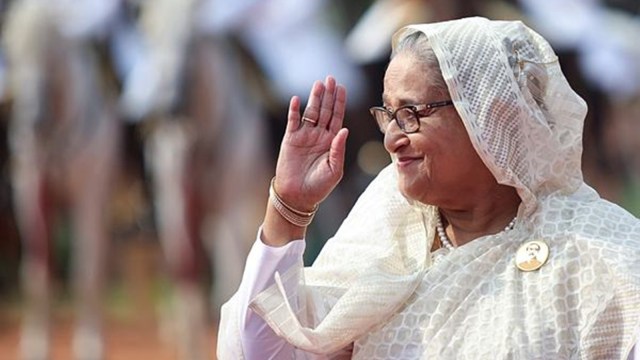The development has the potential to impact bilateral ties — already under strain since Hasina’s arrival on August 5 — and will need some deft diplomacy.

“We have sent a note verbale (diplomatic message) to the Indian government saying that Bangladesh wants her back here for the judicial process,” Touhid Hossain, Foreign Affairs Advisor in Bangladesh’s interim government, said.
Story continues below this ad
The International Crimes Tribunal (ICT) in Dhaka has issued arrest warrants for Hasina and several of her former ministers, advisers, military and civil officials for “crimes against humanity and genocide”.
Delhi confirmed receipt of the extradition request. “We confirm that we have received a note verbale from the Bangladesh High Commission today in connection with an extradition request. At this time, we have no comment to offer on this matter,” MEA spokesperson Randhir Jaiswal said.
Earlier in the day, Bangladesh’s Home Advisor Jahangir Alam said his office had sent a letter to the foreign ministry to facilitate Hasina’s extradition from India. “We have sent a letter to the foreign ministry regarding her extradition. The process is currently underway,” he told reporters in response to a query.
Alam pointed out that an extradition treaty between Dhaka and New Delhi already exists, and Hasina could be brought back under the treaty.
Story continues below this ad
ExplainedSpace for refusal
The India-Bangladesh extradition treaty has provisions for refusing requests, including if the offence is of “political nature”, or an accusation has not been “made in good faith in the interests of justice”, or military offences which are not “an offence under the general criminal law”.
Sources in New Delhi pointed out that the treaty has provision for refusing extradition for “political offences”. “We will examine the grounds (under which extradition is being sought) and the legal points and then decide,” said a source.
Hasina’s presence in India and her public statements have strained India-Bangladesh ties over the last four months. Bangladesh interim government’s Chief Advisor Prof Muhammad Yunus had flagged this concern during his meeting with Foreign Secretary Vikram Misri in Dhaka on December 9.
While describing the India-Bangladesh relationship as “very solid” and “close”, Yunus had asked India to help clear the “clouds” that had cast a shadow over the relationship in recent times, according to his office. Yunus’s office had said he also raised the issue of Hasina. “Our people are concerned because she is making many statements from there. It creates tensions,” he had told Misri.
Earlier this month, in her first public address (online) after fleeing Bangladesh, Hasina had accused Yunus of perpetrating “genocide” and failing to protect Hindus and other minorities. “Today, I am being accused of genocide. In reality, Yunus has been involved in genocide in a meticulously designed manner. The masterminds — the student coordinators and Yunus — are behind this genocide,” she had said.
Story continues below this ad
Hasina had also alleged that police personnel, members of minority communities and Awami League leaders were killed during the protests, and “mosques, shrines, dargahs, churches and Buddhist places of worship” were attacked.
“Hindus, Buddhists, Christians — no one has been spared. Eleven churches have been razed, temples and Buddhist shrines have been broken. When the Hindus protested, the Iskcon leader was arrested,” she said, in an apparent reference to the recent arrest of Bangladeshi monk Chinmoy Krishna Das. “What is this persecution of minorities for? Why are they being ruthlessly persecuted and attacked? People no longer have the right to justice…I never even got the time to resign,” she had said.
Before that, Hasina also issued statements, either through her US-based son Sajeeb Wazed or through the Awami League’s social media accounts.
In November-end, she condemned the monk’s arrest and the murder of a lawyer in Chittagong. “A top leader of the Sanatan religious community has been unjustly arrested. He must be released immediately. A temple has been burnt in Chittagong. Previously, mosques, shrines, churches, monasteries and homes of the Ahmadiyya community were attacked, vandalised and looted and set on fire. Religious freedom and security of life and property of people of all communities should be ensured,” she said in a statement released by her party.
Story continues below this ad
On August 13, in her first statement since fleeing Bangladesh, Hasina issued a clarion call for justice. “I demand punishment for those responsible for the killings and sabotage, through investigation… I sympathise with those like me who continue to live with the pain of losing near and dear ones. I demand a proper investigation to identify those involved in these killings and terror acts, and appropriate punishment for them,” she had said.









